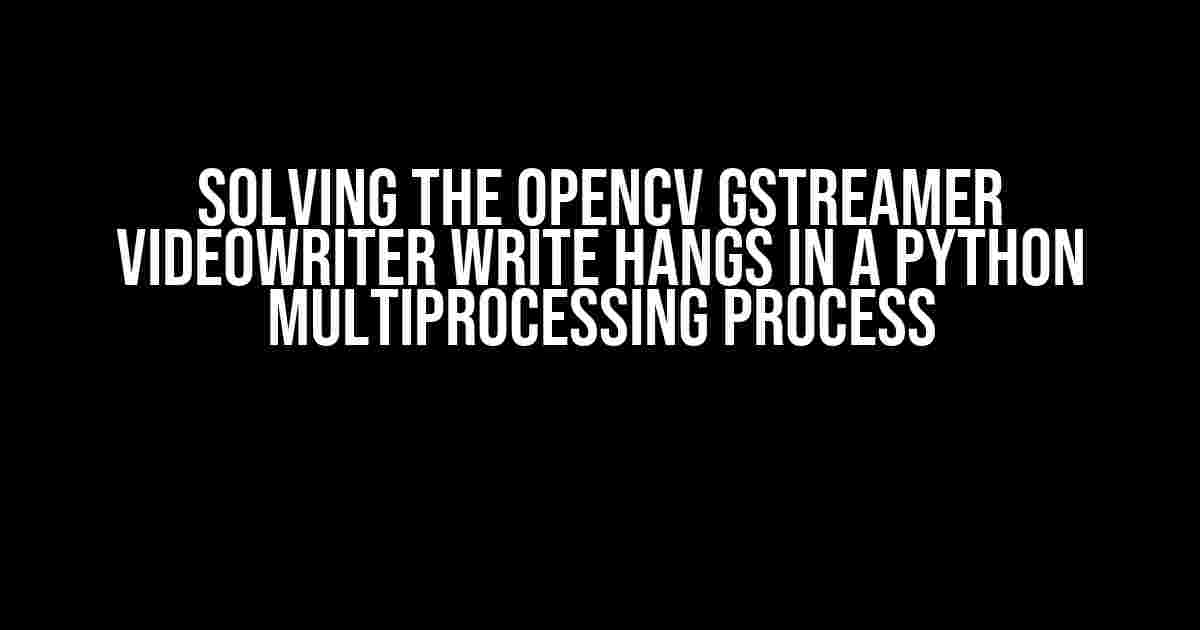The Problem
If you’re reading this, chances are you’ve encountered one of the most frustrating issues in computer vision development: OpenCV’s VideoWriter hangs indefinitely when writing video frames within a Python multiprocessing process using GStreamer. This problem can be a showstopper, but fear not! We’ll dive into the root cause and provide a comprehensive solution to get you back on track.
Understanding the Issue
The OpenCV VideoWriter class is a powerful tool for writing video files. When used in a Python multiprocessing process, it leverages GStreamer to handle the encoding and writing of video frames. However, in certain scenarios, the VideoWriter can hang indefinitely, causing your entire process to freeze.
Symptoms
- Your Python script appears to freeze or hang when writing video frames using OpenCV’s VideoWriter.
- The process consumes high CPU resources, but no video file is being written.
- Debugging attempts reveal that the script is stuck in the VideoWriter.write() function.
Causes of the Hang
There are several reasons why the VideoWriter might hang in a Python multiprocessing process. Some common causes include:
- Incompatible GStreamer version**: OpenCV’s VideoWriter is sensitive to the GStreamer version used. If the GStreamer version is too old or too new, it can cause compatibility issues.
- Incorrect video codec configuration**: Improperly configured video codecs can lead to encoding issues, causing the VideoWriter to hang.
- Insufficient system resources**: When multiple processes are competing for system resources, the VideoWriter might hang due to lack of available memory or CPU.
- Poorly implemented multiprocessing**: Incorrect usage of Python’s multiprocessing module can lead to synchronization issues, causing the VideoWriter to hang.
Solution Overview
To overcome the OpenCV VideoWriter hang issue in a Python multiprocessing process, we’ll employ a multi-step approach:
- Update GStreamer to a compatible version.
- Configure the video codec correctly.
- Implement efficient multiprocessing using Python’s multiprocessing module.
- Optimize system resource allocation.
Step 1: Update GStreamer to a Compatible Version
First, ensure you have a compatible GStreamer version installed. OpenCV’s VideoWriter is known to work seamlessly with GStreamer 1.14.x and 1.16.x. You can check your GStreamer version using the following command:
gst-inspect-1.0 --versionIf your GStreamer version is outdated, update it using the following command (for Ubuntu-based systems):
sudo apt-get install libgstreamer1.0-dev libgstreamer-plugins-base1.0-devStep 2: Configure the Video Codec Correctly
A correctly configured video codec is crucial for smooth video writing. We’ll focus on the H.264 codec, which is widely supported and efficient. Create a Four Character Code (FOURCC) for the H.264 codec:
fourcc = cv2.VideoWriter_fourcc(*'X264')Next, define the video codec properties:
fps = 30.0
width = 640
height = 480
codec = cv2.VideoWriter_fourcc(*'X264')
Step 3: Implement Efficient Multiprocessing
Python’s multiprocessing module allows us to distribute tasks across multiple processes. To avoid synchronization issues, we’ll use the `Process` class and implement a queue-based approach to manage video frame writing:
import multiprocessing
import queue
# Create a queue to store video frames
frame_queue = multiprocessing.Manager().Queue()
# Define the video writing process
def write_video_process(frame_queue, video_file_path):
video_writer = cv2.VideoWriter(video_file_path, codec, fps, (width, height))
while True:
try:
frame = frame_queue.get(block=True, timeout=1)
video_writer.write(frame)
except queue.Empty:
break
video_writer.release()
# Create the video writing process
process = multiprocessing.Process(target=write_video_process, args=(frame_queue, 'output.mp4'))
process.start()
# Capture video frames and put them in the queue
while capture.read():
frame_queue.put(frame)
# Signal the video writing process to stop
frame_queue.put(None)
process.join()
Step 4: Optimize System Resource Allocation
To ensure efficient system resource allocation, we’ll implement a few tweaks:
- Limit CPU usage**: Use the `taskset` command to limit CPU usage for the video writing process. This prevents other processes from competing for resources:
taskset -c 0-3 python script.pyulimit -v 4096Conclusion
By following these steps, you should be able to overcome the OpenCV VideoWriter hang issue in a Python multiprocessing process. Remember to update GStreamer to a compatible version, configure the video codec correctly, implement efficient multiprocessing, and optimize system resource allocation. With these measures in place, you’ll be able to write video files smoothly and efficiently.
Additional Tips and Tricks
For further optimization and troubleshooting:
- Use the `cv2.CAP_GSTREAMER` flag**: When capturing video frames using OpenCV, use the `cv2.CAP_GSTREAMER` flag to leverage GStreamer’s capabilities:
cap = cv2.VideoCapture(0, cv2.CAP_GSTREAMER)| Config Option | Description |
|---|---|
| fourcc | Four Character Code for the video codec (e.g., X264) |
| fps | Frames per second for the video |
| width | Width of the video frames |
| height | Height of the video frames |
Remember to adapt these instructions to your specific use case and requirements. Happy coding!
Frequently Asked Question
Get the inside scoop on troubleshooting OpenCV GStreamer VideoWriter write hangs in a Python multiprocessing process!
Why does my OpenCV GStreamer VideoWriter hang when writing video frames in a Python multiprocessing process?
One possible reason is that the GStreamer pipeline is not being properly initialized or released in the multiprocessing process, causing the VideoWriter to hang. Make sure to initialize and release the pipeline correctly in each process, and also consider using `gst_init()` and `gst_deinit()` functions to initialize and release the GStreamer framework.
How can I debug the issue of OpenCV GStreamer VideoWriter hanging in a Python multiprocessing process?
To debug this issue, you can try enabling GStreamer debug logs by setting the `GST_DEBUG` environment variable to a desired level (e.g., `GST_DEBUG=3`). This will provide more detailed logs about the GStreamer pipeline and help you identify the cause of the hang. Additionally, you can use tools like `gdb` or `pudb` to debug the Python process and analyze the call stack when the hang occurs.
What are some common mistakes to avoid when using OpenCV GStreamer VideoWriter in a Python multiprocessing process?
Common mistakes to avoid include not releasing the GStreamer pipeline properly, not initializing the pipeline in each process, using a shared `VideoWriter` object across multiple processes, and not handling exceptions correctly. Make sure to follow best practices for multiprocessing and GStreamer usage to avoid these common pitfalls.
Can I use a single OpenCV GStreamer VideoWriter instance across multiple Python multiprocessing processes?
No, it’s not recommended to share a single `VideoWriter` instance across multiple processes. Each process should have its own `VideoWriter` instance, and the GStreamer pipeline should be initialized and released in each process separately. Sharing a `VideoWriter` instance can lead to synchronization issues and hangs, as multiple processes may try to access the same pipeline simultaneously.
Are there any alternative solutions to using OpenCV GStreamer VideoWriter for video writing in a Python multiprocessing process?
Yes, you can consider using alternative libraries like `moviepy` or `imageio` for video writing, which might be more suitable for multiprocessing environments. These libraries provide more flexible and Pythonic APIs for video writing and may not require the use of GStreamer. However, they might have different performance characteristics and limitations, so be sure to evaluate them carefully for your specific use case.


